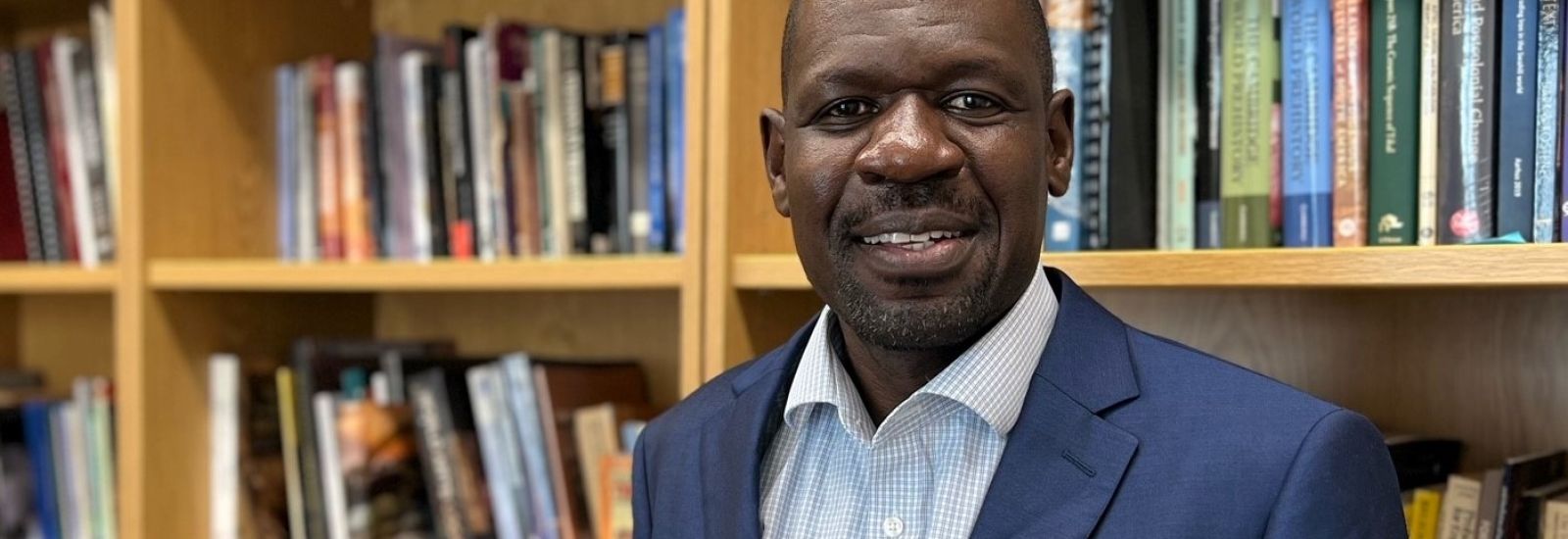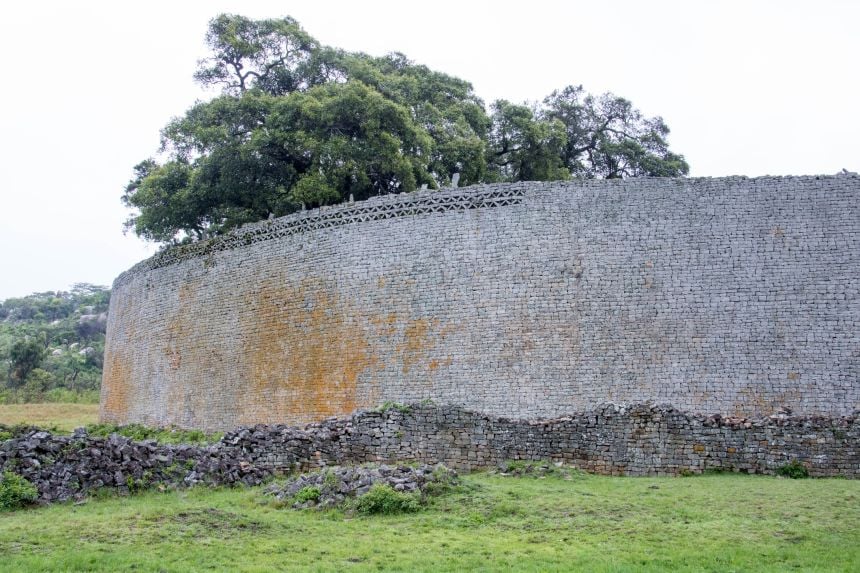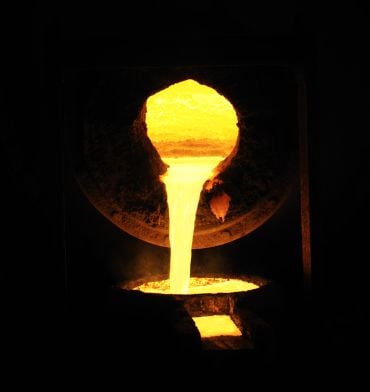
Professor Shadreck Chirikure: We owe a lot to the past. Archaeology can take us back to the future.
Professor Shadreck Chirikure defies expectations: an archaeologist of ancient civilisations who is fixed on the future; an expert in highly-technical sciences, who likes to mend random things, and a disarmingly humourous story-teller, whose colleagues claim he has the skills of a stand-up comedian.
‘I might try that,’ he laughs. ‘But I’ve never been in stand-up. I think he was referring to my Ted Talk – it was quite funny.’
Professor Chirikure’s online lectures are really funny and he talks quickly with the urgency of an alternative comedian. But his message is serious. He insists that the interview must not just be about him, which he clearly finds boring. Professor Chirikure has a very clear message about the importance of archaeological science and what it can tell us the past – for the benefit of the future. He moves rapidly over his story, and on to what he really wants to talk about.
The young Shadreck was born in arid southern Zimbabwe, just 60km from the iconic Great Zimbabwe site, which was to become so defining in his career. He was a hard-working schoolboy and his family on both sides were teachers but, he says, he had no interest in becoming an archaeologist. He wanted to work in finance.
An unusual ambition, perhaps, for a child in a deeply rural location in Gutu district of Masvingo province. But, he laughs, the idea came to him after some visitors came to his primary school. They told the children how, if someone’s cattle died, or if the crops failed, they would replace them.
The professor only became an archaeologist by accident, he says self-deprecatingly. He failed in this first ambition and did not get high enough grades to study finance
What marvellous people, thought, Shadreck, who had already seen the devastating impact of drought on farmers’ livestock and crops. What he did not know, however, was that they were insurance sales people, offering to replace cattle and crops – for regular payments.
‘It was a simple way of selling insurance,’ he says. ‘But I thought that’s something I want to do – finance.’
But it was also to be a turning point, and Shadreck was, thereafter, determined to pursue a career in finance. It was and is very much the favoured profession in Zimbabwe, he says, where there are too many accountants and not enough people who do things and make things.
The professor only became an archaeologist by accident, he says self-deprecatingly. He failed in this first ambition and did not get high enough grades to study finance at the University of Zimbabwe.
Instead, as he tells it, the University of Zimbabwe, in the capital Harare, entered him for Archaeological Sciences. Somewhat reluctantly, he took the course and did extremely well, so well that, at the end of his undergraduate degree, he was offered a scholarship to take a Masters and then a Doctorate at University College London.
‘I did archaeology and History and Economic History. I got fairly good grades, so I got a scholarship and went to London,’ he says in a typical matter-of-fact way.
It was really boring...I had decided to go to the Business School and study finance at Cape Town, but when I started, I did not cross the Rubicon. I did not move into finance
Professor Chirikure
Despite this very successful diversion, however, he had still not given up hope of a life in finance, he insists. After UCL, the new Dr Chirikure moved to Cape Town, where he started work as an academic archaeologist – ‘my first job’, he recalls with amusement. And, at the same time, he says, he finally got to start a course in business. It was not too late, he thought, for a different direction. But there was one huge problem.
‘It was really boring,’ he says, roaring with laughter. ‘I had decided to go to the Business School and study finance at Cape Town, but when I started, I did not cross the Rubicon. I did not move into finance. I realised I would be really bored.’
Finance’s loss was very much Archaeological Sciences’ gain. It offered an entirely different challenge, he says, ‘Archaeology had so much in terms of opportunities.’
 Great Zimbabwe
Getty Images
Great Zimbabwe
Getty ImagesArchaeology is not Indiana Jones and digging for gold, he says. Although Professor Chirikure admits he has, in fact, dug and found gold (at Great Zimbabwe) and...he worked on one of the biggest finds-ever of gold coins
But, says Professor Chirikure, the great opportunity of Archaeology is to provide both a window back into the past – and to the future.
His work at sites in southern Africa, including at the medieval ruins at Great Zimbabwe – after which the country was named - have highlighted the sophisticated civilisations which existed in southern Africa pre-colonisation, complete with evidence of international and pan-African trade, commerce and manufacture.
Crucially, taking a local perspective, rather than using a European lens, he was able to draw out stories of the civilisation, which did not mirror the societies of Europe, but were distinctively African.
For instance, his research revealed that the impressive walls of the ruin were not the stronghold of an elite class, like a castle in medieval England, but a local centre.
The great opportunity of Archaeology is to provide both a window back into the past – and to the future
Professor Chirikure
With his background in metallurgy and interest in technology, Dr Chirikure also highlighted Great Zimbabwe’s importance as a manufacturing centre. This continues to be a critical aspect to his work and why he believes Archaeology is so relevant to lives today.
Understanding the importance and strengths of past great civilisations, he believes, points a future for modern Africa. Professor Chirikure insists, ‘There were great knowledge and skills achieved over time. Half the time, we ignore them. But for me this is exploring. At Great Zimbabwe, our research shows, they were innovating, they had important knowledge. We need to use that knowledge today.’
His work at sites in southern Africa, including at the medieval ruins at Great Zimbabwe – after which the country was named - have highlighted the sophisticated civilisations which existed in southern Africa pre-colonisation
It is what makes Archaeology a critical subject, he insists, a bridge from the past to the present, ‘People see archaeology as a backwards-looking discipline. But we can look backwards to the future – and use the knowledge of generations that has been lost.’
Prof Chirikure insists he is not talking about recreating the past or living in the past. He is very much living in the present. He has talked in public lectures about past African civilisations and the fact some countries on the continent are a laboratory for current misery. Part of this, he says, is because people do not learn the lessons of the past and produce the successful and nutritious crops that people used to do or understand food storage methods of the past, which have been proven to work.
And, he says, there is a major problem with deskilling. Great Zimbabwe, he says, demonstrates the skills and trades of a past civilisation.
At Great Zimbabwe, our research shows, they were innovating, they had important knowledge. We need to use that knowledge today
Professor Chirikure
When he was growing up, says Professor Chirikure, people living in rural communities had to learn to mend things – because they lived such a long way from repair shops and belongings had to be repaired and restored. Like everyone else in Gutu district, he learned to mend things, he says, and even today he enjoys patching things up, although he prefers not to give details, ‘We are no longer makers or even menders…we are consumers and the consequences are severe for the environment. It’s unsustainable.’
Professor Chirikure first came to Oxford, from South Africa, in 2019 as a British Academy Global Professor. During his term he became in 2022 the Edward Hall Professor of Archaeological Sciences. In Archaeology terms, this post is a huge deal. He is only the second holder – after the distinguished Edward Hall’s retirement.
He loves the interdisciplinary nature of Oxford and the opportunities to work and meet with people from across the university. He also clearly relishes the academic community – although it is hard to think of another senior researcher at Oxford who would modestly commence a public lecture with a PowerPoint image of his wife and children and say he was lucky to be married to a woman who was cleverer than he.
It is hard to think of another senior researcher...who would modestly commence a public lecture with a PowerPoint image of his wife and children and say he was lucky to be married to a woman who was cleverer than he
But, despite his current role, Professor Chirikure has categorically not left his work in Africa behind. He maintains his interest in the materials archaeology at various sites – and he has expanded his work to include, among other things, a Viking project. And, determined to help, he also works with the United Nations Special Adviser on Africa and advises government agencies in Africa to help promote technological learnings from the past and create economic opportunities for future prosperity.
The great thing about Archaeological Sciences, he says, it is so inter-disciplinary, it can provide many answers, ‘It combines, chemistry and geo-science and anthropology and problem solving.’
 Copper smelting: AI of the past
Getty Images
Copper smelting: AI of the past
Getty Images‘Smelting copper was the AI of the past,’ he laughs, but he adds seriously, ‘We have lost through specialization. But we can learn from the past what technology people used, what skill sets they had, what resource management and risk management strategies they used.
Archaeology allows us to bring many disciplines together, and we can look at challenges in society right now and see how humans used sciences to overcome things in the past
‘Great Zimbabwe was a manufacturing hub in ceramics and metals…what viable industry is there today?
‘Knowledge from the past can be applied to innovation and entrepreneurship today.’
He is shocked by the fact that some small Archaeology departments around the UK are threatened with closure.
‘In the UK, people talk about STEM,’ he says. ‘But you need the cultural context…we owe a lot to the past. A lot of things claim to be new, that are not. We can learn from local ways and know-how.
‘In the past, people did lots of different things. Look at Leonardo da Vinci – he was architect, a scientist, a painter, a thinker…is there a person alive today who can do all those things?’
Professor Chirikure maintains, ‘Look at how successful the Renaissance was [and that was a resurgence of interest in classical civilisation].’
We need a world view that is not just a big tech world view. We can learn from past societies
Professor Chirikure
One of Professor Chirikure’s research interests is Being Human and he speaks sadly of the loss of humanity and humans and its potentially harmful impact on developing societies in particular, ‘Humans are makers and users. If you take humanity out of this process and we no longer know how to make anything, then there will be greater inequality.’
While not disagreeing with the use of Artificial Intelligence in research and the economy, he insists, ‘We need a world view that is not just a big tech world view. We can learn from past societies.’
Since taking over his prestigious chair of Archaeological Science, Professor Chirikure has championed a link with West Africa, which will see Oxford’s School of Archaeology in partnership with local museums and students in Nigeria. This will help develop expertise in the region, enhancing the Archaeological opportunities and understanding of past peoples.
The past is gone, civilisations have changed...and we need to apply the knowledge we have forgotten
Professor Chirikure
‘It is important this is an equal partnership,’ he says. ‘The knowledge of cutting-edge science will be very helpful and also help bring a different perspective to research….it is important people learn from deep history. We can help to mobilise the past for the present.’
With a smile, he says seriously, ‘The past is gone, civilisations have changed, the world’s population has crossed eight billion…and we need to apply the knowledge we have forgotten.’
By Sarah Whitebloom